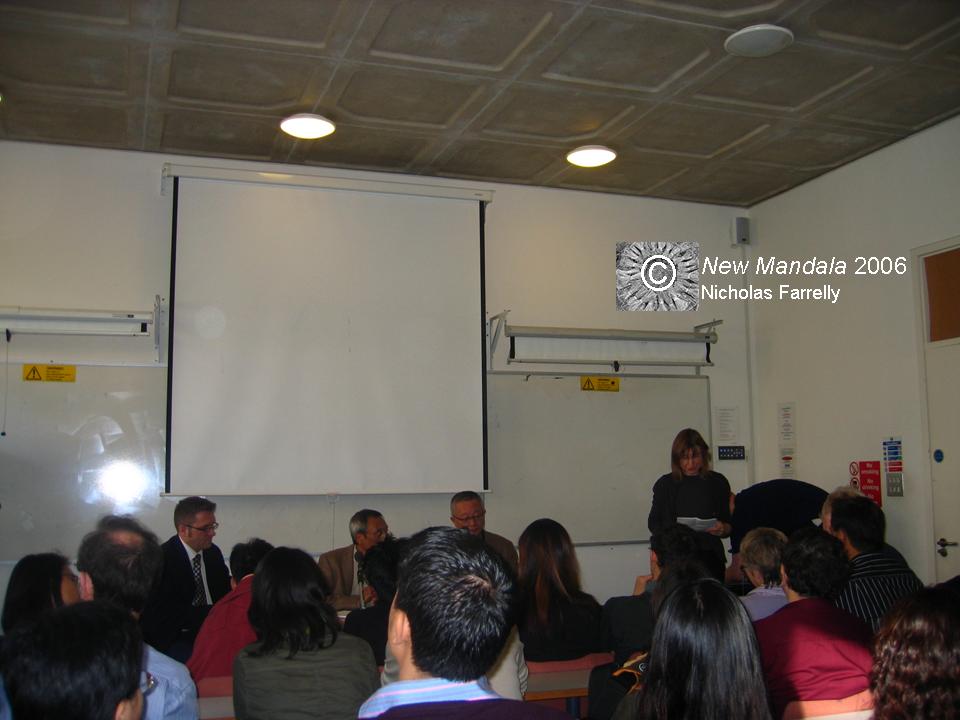On the afternoon of Saturday, 8 October 2006, New Mandala attended the School of Oriental and African Studies seminar titled “Thailand under CEO Thaksin”. Last week, there was, of course, some controversy regarding the format of this event. Regular New Mandala contributor, Dr Patrick Jory, had earlier voiced some concerns about its structure and speakers. The Nation carried an article before the seminar which helps to put Jory’s comments in some context.
The forum, chaired by new SOAS politics lecturer, Dr Jason Abbott, heard major contributions from Senator Kraisak Choonhavan and Sondhi Limthongkul. They are both prominent anti-Thaksin campaigners. Over 100 people crammed the main room while others watched a video feed that was broadcasted to another room and on the Internet. The video footage of the event is now available online. For Sondhi’s perspective on Saturday’s events, The Manager website (which he owns) is carrying a number of descriptive Thai-language articles, with pictures.
Dr Rachel Harrison, Senior Lecturer in Thai Cultural Studies at SOAS, introduced Saturday’s session and described it as an “initial move towards opening up debate and discussion”. She re-emphasised this point by describing SOAS plans to host more debates and seminars on Thailand’s current political situation. Saturday’s seminar was, she said, “an opening session in an ongoing debate”. Over the next week, and in this spirit of debate, New Mandala will carry a series of posts that highlight key aspects of the seminar. In our view, Saturday’s noteworthy discussions of the monarchy, rural politics and Thaksin’s mis-deeds deserve a wider audience and further interpretation and analysis.
Very briefly, Saturday’s discussion provided a cogent and usually well-informed summary of the Thaksin administration’s many faults. Particular emphasis was, quite rightly, given to the extrajudicial killings which marred Thaksin’s widely publicised “War on Drugs”. In the words of a number of speakers, these excesses were the work of the “Thaksin regime”. Senator Kraisak even referred to Thaksin as the “so-called democratically elected Prime Minister”. Unsurprisingly, Kraisak and Sondhi bitterly attacked Thaksin and his “regime”, but also expressed sincere and critical concern that the coup carries its own risks for the Thai polity.
Sondhi argued that, last month, there were no political options except for the coup. He said he was “relieved” but “worried” by the recent military intervention. In general, he blamed the lack of accompanying institutions for the poor performance of democracy in Thailand. He particularly highlighted the lack of political education among rural people, and the poor, as the key problem for Thailand’s democratic prospects.
His basic agenda, as outlined in response to a number of forceful questions, is to create an urban vanguard that can educate the masses and lead to greater political reform. Crucially, there is little sense of rural voter agency in his comments. Under current conditions, he is wary of power that comes from a rural base. He described the main “problem of Thai democracy [as] that of information”.
Andrew and I will be putting together thematic posts on a number of aspects of the seminar. If you were there, or just have comments that you would like to express on this seminar, then please wade in to the debate.
All points of view are very welcome.
 Facebook
Facebook  Twitter
Twitter  Soundcloud
Soundcloud  Youtube
Youtube  Rss
Rss 